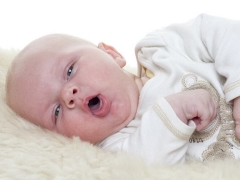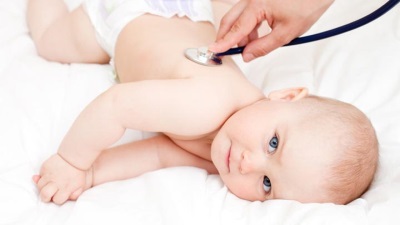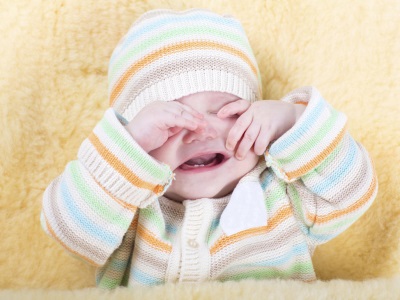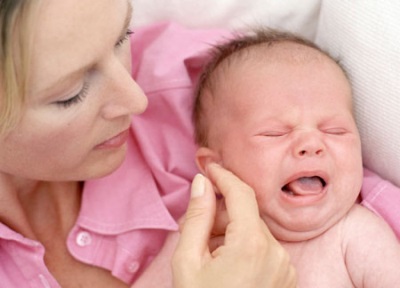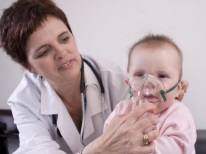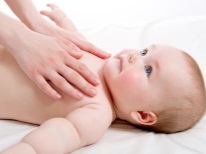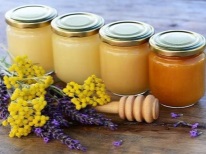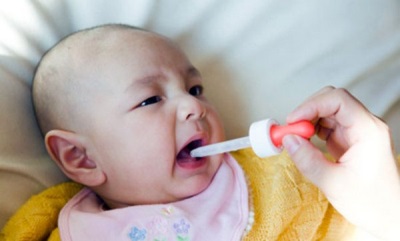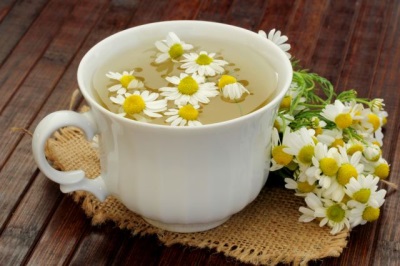Cough in an infant
Parents react to the cough of the baby differently - some ignore it, especially if the temperature is normal and there is no cold, while others are rushing to heal with both folk and pharmaceutical means. Both options can be called extremes, because when you cough a baby of an infant, both at 3 months and at 6 months or older, you should find out its cause and only then begin any treatment.
What is a cough?
So called reflex, helping to clean the respiratory tract from any foreign substances, such as dust particles, allergens, viruses, crumbs, accumulated mucus or pathogenic bacteria. In infants, cough is a sharp loud exhalation, in which air from the respiratory tract comes out at an increased rate.
Types of cough and causes
Depending on the factors causing cough, it is divided into physiological (necessary for the purification of the respiratory tract) and pathological (appearing in many diseases).
Cough is a symptom of such diseases:
- ARVI
- Angina
- Laryngitis
- Pharyngitis
- Bronchitis
- Tracheitis
- Sinusitis
- Pneumonia
- Bronchial asthma
- Tuberculosis
- Whooping cough and other infections
- Allergy
- Helminth infestation
If you pay attention to expectoration of sputum, then there are such types of cough as dry (sputum does not stand out) and wet (it is also called productive or wet). Normally, a newborn baby of 2 months or older can cough up sputum in the morning because it accumulates during the night's sleep. During the day, the infant will not have a cough, and the general condition will not change.
Assessing the sound of dry cough in an infant, you can define it as:
- Barking - a loud cough, resembling a dog barking, usually occurring with laryngitis.
- Pulmonary - exhausting paroxysmal cough.
- Superficial - characteristic of pharyngitis.
Cough not associated with sore throat
- An infant may begin to cough because of the ingestion of a foreign object, such as small toys or parts thereof. At the same time, besides the sudden onset of coughing in a child, the voice may disappear, breathing becomes difficult, and the skin may turn blue. This situation should be the reason for the immediate call of the ambulance.
- The occurrence of cough in an infant, for example, at the age of 5 months, can also be caused by an allergic reaction. A crumb can react by coughing pollen, food allergens, dust, down pillows and many other substances and objects. To help a child with such a cough, it is important to identify the allergen and eliminate its effects.
- Another cause of coughing without respiratory diseases is helminthiasis. The larvae of some types of worms, developing in the body of a child, can pass through the lungs. During coughing, they, along with mucus, pass into the gastrointestinal tract and thus reach the intestines.
- Also note that the cause of dry cough in infants may be excessively dry air in the room.In this case, the problem is easily solved with a humidifier or other sources of moisture (containers with water, wet towels).
- Babies can cough and during meals, if milk comes in too quickly. A change of posture during breastfeeding or a change in nipples in the case of bottle feeding will help eliminate such a cough.
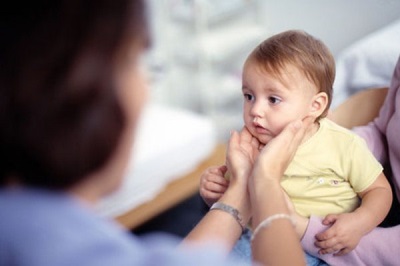
Dangerous symptoms (when coughing is dangerous)
Parents need to be alert and quickly show the baby to the doctor if:
- The cough appeared suddenly and does not stop.
- Simultaneously with the cough, the baby began to wheeze, which can be heard from afar.
- Cough occurs at night in the form of attacks.
- The baby coughs up phlegm in red or green.
- Cough lasts longer than three weeks.
How to treat?
When coughing of any kind occurs in a baby, for example, at 4 months, you should first determine whether it is a variant of the norm or is caused by a disease. To do this, you need to show the crumbs to your doctor, since any medicines against cough in children younger than a year should be taken only after the appointment of a pediatrician or LOR.
In addition to drugs in the treatment of infants with a cough, use:
- Inhalation. Depending on the way they are carried out, they are steam and nebulizer. Keep the infant above the steam should be very careful to eliminate the risk of burns. AT nebulizer for inhalations in infancy without a pediatrician's appointment, only saline or borjomi should be poured.
- Drainage massage. It is carried out on babies who do not have a fever, from the 4th to the 5th day of illness, in order to improve sputum separation. With this massage, the baby's head is located below the body. First, massage the back, and then the chest. After the massage, the baby should be wrapped and put in the crib, regularly changing the position of the body.
- Folk remedies. These include the use of herbal decoctions, cakes with honey and rubbing badger fat.
Overview of the best tools
Among the drugs that the doctor can prescribe for infants when coughing, there are drugs such groups:
- Antitussive drugs. They reduce the activity of the cough center and are written out only when exhausting strong dry cough. It is important to remember that drugs of this group are not combined with expectorant.
- Expectorant drugs. Their action is to improve expectoration of sputum. At the age of one, babies are prescribed Gedelix, Prospan, Linkus, Herbion ivy, Bronchipret or Licorice Root Syrup.
- Mucolytics. Such funds reduce the viscosity of sputum, which contributes to its better separation. These include ambroxol-approved preparations for infants.
- Antihistamines. Such drugs are prescribed in cases of allergic cough.
- Antibiotics. Their purpose is necessary for bacterial infections that manifest cough, for example, pneumonia or angina.
Breast fees
For the treatment of cough often use medicinal herbs, combining them in various combinations in the form of chest charges. In such collections may be attended by marshmallow, anise, mother and stepmother, plantain, licorice, sage, oregano and other herbs. Nevertheless, in order to avoid allergies and other side effects, experts advise giving infants one-component decoctions.
Can I use chamomile in the treatment of infants?
Such a medicinal plant is often used in the age of up to one year, since it has anti-inflammatory and antimicrobial effects. If you have made chamomile for a baby for the first time, let's take a few drops of this vegetable remedy to check the body's reaction.
To prepare the broth, take a tablespoon of dried flowers and a glass of boiling water, cover the container with a lid, and strain after 10 minutes. It is advised to give such chamomile tea three times a day, half an hour after feeding, in an amount up to 30 ml for babies of the first months of life.
Chamomile can also be used for inhalation. Brewed dried flowers need to insist 40 minutes, then boil a liter of water and pour broth into it, then bring the baby to the container so that the little one breathes steam for 5-10 minutes.
Passive inhalation
For such procedures in the bathroom they pour a little boiling water into the bath so that the room is filled with steam. Then they enter the room with a baby and sit in it for about 10 minutes. If the baby does not have a tendency to allergies, you can add a little eucalyptus oil to the bath.
Opinion Komarovsky
A well-known doctor calls cough the natural reaction of a child’s body to any foreign substances in the airways. If such a cough occurs in infants, Komarovsky recommends that you contact your pediatrician and not give the crumbs up to a year before taking any medication on their own.
With regard to drugs against cough, popular pediatrician recommends focusing on other ways to make dry cough productive - moistening the air in the room and drinking plenty of. According to Komarovsky, these methods are no less effective than any expectorant syrups. About this next short video.
Tips
- Regularly ventilate the room in which there is a baby with a cough, because he really needs fresh air.
- It is desirable that the temperature in the room does not exceed + 22 ° C.
- If the body temperature of a baby is normal, be sure to go for a walk with a baby.
- Change the position of the baby in the crib and more often take it in your arms.
- To make the child drink more, offer him a drink from a new, cute cup, through a straw or from a bright non-sprinkler.
- If your child has a runny nose besides coughing, rinse the spout with water and sea salt, such as aquamarine.
